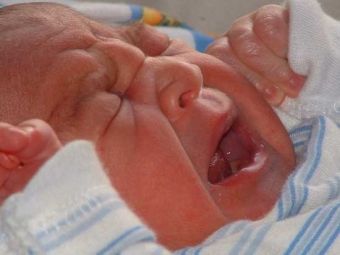
Publisher:
Bonnie King
CONTACT:
Newsroom@Salem-news.com
Advertising:
Adsales@Salem-news.com

~Truth~
~Justice~
~Peace~
TJP
Feb-22-2011 13:19

 TweetFollow @OregonNews
TweetFollow @OregonNews
Crying Baby Draws Blunted Response in Depressed Mom's Brain
Salem-News.comResearchers use fMRI at the University of Oregon to see how brains differ in depressed and non-depressed mothers, identifying key differences; findings could pave way to more focused treatment approaches.
 Courtesy: lifeasahuman.com |
(EUGENE, Ore.) - Mothers who are depressed respond differently to their crying babies than do non-depressed moms. In fact, their reaction, according to brain scans at the University of Oregon, is much more muted than the robust brain activity in non-depressed moms.
Crying by infants is a normal occurrence, but how mothers respond can affect a child's development, says Jennifer C. Ablow, professor of psychology. For years, Ablow has studied the relationship of behavior and physiological responses such as heart rate and respiration of mothers, both depressed and not, when they respond to their infants' crying.
A new study -- online in advance of publication in the journal Social Cognitive and Affective Neuroscience -- provides the first look at brain activity of depressed women responding to recordings of crying infants, either their own or someone else's. The brains of 22 women were scrutinized using functional magnetic resonance imaging (fMRI).
Non-invasive fMRI, when focused on the brain, measures blood flow changes using a magnetic field and radio frequency pulses, producing detailed images that provide scientists with information about brain activity or help medical staff diagnose disease.
Researchers considered both group differences between women with chronic histories of depression and those with no clinical diagnoses, and more subtle variations in the women's brain activity related to current levels of depressive symptoms. All were first time mothers whose babies were 18 months old.
"It looks as though depressed mothers are not responding in a more negative way than non-depressed mothers, which has been one hypothesis," said Heidemarie K. Laurent, assistant professor at the University of Wyoming, who led the study as a postdoctoral researcher in Ablow's lab. "What we saw was really more of a lack of responding in a positive way."
As a group, brain responses in non-depressed mothers responding to the sound of their own babies' cries were seen on both sides of the brain's lateral paralimbic areas and core limbic sub-cortical regions including the striatum, thalamus and midbrain; depressed mothers showed no unique response to their babies. Non-depressed mothers activated much more strongly than depressed mothers in a subcortical cluster involving the striatum -- specifically the caudate and nucleus accumbens -- and the medial thalamus. These areas are closely associated with the processing of rewards and motivation.
"In this context it was interesting to see that the non-depressed mothers were able to respond to this cry sound as a positive cue," Laurent said. "Their response was consistent with wanting to approach their infants. Depressed mothers were really lacking in that response."
In a separate comparison, mothers who self-reported that they were more depressed at the time of their fMRI sessions displayed diminished prefrontal brain activity, particularly in the anterior cingulate cortex, when hearing their own baby's cries. This brain region, Laurent said, is associated with the abilities to evaluate information and to plan and regulate a response to emotional cues.
The important message of the study, Ablow and Laurent said, is that depression can exert long-lasting effects on mother-infant relationships by blunting the mother's response to her infant's emotional cues.
"A mother who is able to process and act upon relevant information will have more sensitive interactions with her infant, which, in turn, will allow the infant to develop its own regulation capacities," Ablow said. "Some mothers are unable to respond optimally to their infant's emotional cues. A mother's emotional response requires a coordination of multiple cortical and sub-cortical systems of the brain. How that plays out has not been well known."
The findings may suggest new implications for treating depression symptoms in mothers, Laurent said. "Some of these prefrontal problems may be changed more easily by addressing current symptoms, but there may be deeper, longer-lasting deficits at the motivational levels of the brain that will take more time to overcome," she said.
We regard the findings as a "jumping-off point" to better understand the neurobiology of the mothering brain, said Ablow, co-director of the UO's Developmental Sociobiology Lab. "In our next study, we plan to follow women from the prenatal period through their first-year of motherhood to get a fuller picture of how these brain responses shape mother-infant relationships during a critical period of their babies' development."
The National Science Foundation, through a grant to Ablow, and a National Institute of Mental Health postdoctoral fellowship to Laurent, funded the research. The project also received a pilot grant from the UO Brain Biology Machine Initiative through the Lewis Center for Neuroimaging.
About the University of Oregon
The University of Oregon is among 108 institutions chosen from 4,633 U.S. universities as providing "Very High Research Activity" in the 2010 Carnegie Classification of Institutions of Higher Education. The UO also is one of two Pacific Northwest members of the Association of American Universities.
Articles for February 21, 2011 | Articles for February 22, 2011 | Articles for February 23, 2011

Quick Links
DINING
Willamette UniversityGoudy Commons Cafe
Dine on the Queen
Willamette Queen Sternwheeler
MUST SEE SALEM
Oregon Capitol ToursCapitol History Gateway
Willamette River Ride
Willamette Queen Sternwheeler
Historic Home Tours:
Deepwood Museum
The Bush House
Gaiety Hollow Garden
AUCTIONS - APPRAISALS
Auction Masters & AppraisalsCONSTRUCTION SERVICES
Roofing and ContractingSheridan, Ore.
ONLINE SHOPPING
Special Occasion DressesAdvertise with Salem-News
Contact:AdSales@Salem-News.com

Salem-News.com:
googlec507860f6901db00.html

Terms of Service | Privacy Policy
All comments and messages are approved by people and self promotional links or unacceptable comments are denied.
[Return to Top]
©2025 Salem-News.com. All opinions expressed in this article are those of the author and do not necessarily reflect those of Salem-News.com.